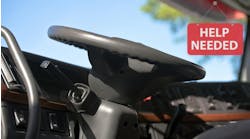"Being behind the wheel, you have nothing but the open road and mile after mile to delve into yourself and be more introspective, analyze your life, and where you want it to go," says Shelle Lichti, a 25-year veteran driver, who is the founder of LGBT Truckers, a 4,000-member group. "Driving gives you the perfect opportunity to recreate yourself. Not only can you take that time to start to heal wounds, psychologically, but you can start to become the person that you are happy being."
All truckers are familiar with the meditative din of the road, but for the LGBT community, the siren song of the highways can be especially luring.
"For the most part, with carriers, they don't care what you do in your truck or who you are as long as you're not destroying the truck and the load gets there on time. So, it's a very good place to kind of figure out who you are," says transgender driver Keaira Finlay, who has been driving for about four years, and currently is with Celadon Trucking in Indianapolis. She has a dedicated route from Bowling Green, KY, to Flat Rock, MI's Ford plant.
Lichti and other LGBT drivers had met in 2008 at the Mid-America Truck Show.
She told of her friend, a gay man who had been gang-raped at a truck stop after being lured there for what he thought was a friendly meeting. The perpetrators were straight. "The justice system and the transportation industry at that time stood by, and my friend self-destructed and killed himself."
She adds: "Nobody stood up for him. The people that, in my mind, killed him were not punished. He had been a driver out here for about 16, 17 years, and this incident destroyed him. And so, sadly, he felt his only escape from pain was to kill himself."
His death was a catalyst for the group's formation.
Lichti, a lesbian, not only believes in equal rights and better treatment for LGBT drivers but for all drivers. The group is active in many driver-based charities including Operation Roger and the Jacob Russell Boulanger Memorial Fund. Currently driving over-the-road almost 11 years for Hirschbach Motor Lines out of East Dubuque, IA, Lichti, who calls herself "an old-school trucker" admonishes the industry for not setting higher driver standards.
"If you have a pulse and can hold a wheel straight, it does feel like that that's what many carriers are looking for. It gets very irritating. For many of us out here, it's frustrating and disillusioning. We've tried to hold these fleets' feet to the fire and hold them accountable for the quality of drivers that they're bringing in, and then overlooking the needs of drivers."
She believes that the driver shortage is a myth and that the real issue is retention. "It's self-perpetuating. It's not a national issue. It's not due to our government and our policies. It's about underpaying and undervaluing your employment force."
In an unexpected way, not having enough drivers can help underrepresented minorities like LGBT individuals enter and stay in the industry. Finlay, who was a jet propulsion mechanic for the Royal Air Force in the UK (a U.S. citizen, she worked as a civilian contractor), went from being one of her factory's most popular technicians to the most hated person when she transitioned, she says. "They made my life difficult and found a way to get rid of me."
[Editor's note: The subjects in this story were included in a panel on LGBTQ drivers convened by Uber Freight in July as part of their ongoing programs to honor diversity in their workforce.]
To Finlay, trucking became a lifeline of sorts. "A lot of us experience rejection. From family, friends, colleagues," she says. "There are people out there who've left jobs that paid six figures because the workplace became extremely hostile or they couldn't find a job because they were Trans. With the industry crying out for drivers, they're not picky. If you can drive a truck, and not destroy one, keep a good record, then you're golden. You'll have a career."
Like other LGBT drivers, she has her problems on the road but perhaps fewer than others. "I have what some people call 'passing privilege.' Most Trans women that I've met seem to be like six-foot tall. I'm actually under five-foot-five, which helps me not stand out. I don't have a deep voice. This is the voice that I was born with. I haven't trained it or anything. I have small hands and feet, and no visible Adam's apple. So I'm very blessed in that respect."
Despite being aided by her physical appearance, life on the road still is not easy. "I think it was in my first year. I went to use the bathroom, and I had some old lady come out of the bathroom, look at me, and she said very loudly, 'I don't f---ing believe it." I thought, 'Oh, OK. She noticed my purple hair.' Then she washes her hands and starts walking out and glares at me and goes, 'You need to start using the men's room.' Blah blah blah. I just stood there. I was in shock. I didn't know how to respond to that. So I just turned around and left. And there were other women in that bathroom who saw the whole thing. I was embarrassed and hurt."
Finlay adds: "Actually, the weirdest thing is that I get hit on quite a lot. It's funny because when I started my transition, I always thought I would be seen as a man in a dress, that kind of stereotype."
Guys would be practically lining up to date her. "I've even tried saying, 'Look, I'm transgender. This is me.' And for some, it scares them away, and for others it doesn't matter. Maybe they just don’t care or they just like the personality."
Ellie O'Daire drives reefer for Jim Palmer Trucking out of Missoula, MT. They taught her how to drive and she's been with them for over two years. "I made sure they knew I was Trans and that they had spoken with the trainers, and they found someone who I wasn’t going to have a conflict with, and it worked out just fine. They had a trainer at the time, a woman named Leah, who trained me and at least two other transgender drivers, both trans-men and trans-women."
She is very cautious while on the road. "I stick to myself a lot so it’s mostly a matter of figuring out which places I can park that are going to be safe. I favor rest areas and weigh stations because they have a lot of police that go through there. A lot of rest areas also have gender-neutral bathrooms. I try to avoid parking at truck stops that are kind of sketchy.
"Once or twice I've had a few problems with bathrooms in Nebraska. For some reason people just seem weirdly emboldened there [to harass trans-people]. But again, I’ve learned the places that are safer on Interstate 80, in particular, to stop and use the restroom, and to avoid the places where I’ve had problems. The complete opposite was in Wyoming. I’ve had people stop me from using the gender-neutral bathrooms and say, 'Look, we don’t care here, just use the women’s room. No one cares, it’s Wyoming.' I’m like 'all right.'"
Gay male drivers seem to bear the brunt of prejudice while on the road. Bobby and Ricky Coffey-Loy are a married team who drive for Great Lakes Cold Logistics in Warrendale, PA. They are on the road for four weeks and at their Florida home for a week.
Bobby says that the company is supportive of them but not all male drivers on the road are. "Women don’t have as many problems, because it’s more like a male intimidation thing because we are male. We can be sitting in the front seat, literally just sitting up there and they [other male drivers] simply assume that we're gay – and not all male teams are gay – and they’ll get on the CB radio and start cussing us out. Or we’ll be pulling up to the pump to get fuel and they will instantly be like, 'Look at those good buddies,' and then start using derogatory words like faggot and queer and so on. We haven't even said a word. They don’t even know who we are. We’re just sitting here, pulling up to a pump, and we get that abuse."
How do they handle the attacks?
"Most of the time, I just consider the source and the ignorance of it. Some people were raised in certain areas of the country or people were raised in a backwards atmosphere, and [our situation] is out of their comfort zone. They get intimidated by it, but then there are other times that I jump on the mic and I will cuss them out. I will give them hell because they’ve caught me on the wrong day or I've had enough of it. I can get really, really hateful on the mic sometimes. That’s probably not the way you should do it, but if you deal with it on a regular basis, it gets aggravating. I’m a big guy and I have told people before on the mic, 'It’s easy to stand behind a mic and say all that stuff. Come say it to my face ‘cause this gay boy will whip your ass. I’m a big-ass boy. I’m 300 pounds. Come say it to my face.'"
The team also faces prejudice from shippers. "We’ll be the first appointment of the day but I can't walk into a shipper and complain, 'Oh, I’m the first appointment of the day, but you’ve taken everybody else and we've sat here for nine hours.' That does happen. They're not going to tell you to your face exactly, but I have had people say things when I walked away or thought that I'd left the room and say, 'The faggots can wait.'
Bobby concludes: "I’m here to do the same job as the next person beside me. Just because of what I do in the privacy of my own bedroom has nothing to do with my work ethic. We do the job the same as anyone else. It should be looked at that way."







